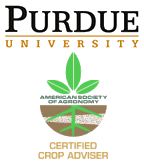
Proceedings 2008
Indiana Certified Crop Adviser Conference
Foliar Fungicides for Corn Production: Always or Sometimes?
Use of foliar fungicides on corn has dramatically increased over the last two years in the Midwestern U.S. Foliar fungicides are often touted to “increase corn yields and improve stalk quality”, but do these benefits occur on a consistent basis? Information regarding the roles of disease pressure, previous crop, and hybrid susceptibility will be presented, and results from University-based fungicide research trials will be discussed.
Carl BradleyAssistant Professor of Plant Pathology
University of Illinois
carlbrad@uiuc.edu
Carl Bradley grew up on a corn/soybean/wheat farm in southeastern Illinois. He attended Southern Illinois University at Carbondale, where he received a B.S. in Plant and Soil Science in 1995. He attended graduate school at the University of Illinois at Urbana-Champaign, where he received both a M.S. in 1999 and Ph.D. in 2001 in Plant Pathology. At the University of Illinois, he conducted research on projects dealing with the biology and management of diseases of soybean. After graduating from the University of Illinois, he worked as a Postdoctoral Research Fellow for the University of Idaho at their Research and Extension Center in Kimberly, ID. In Idaho, he conducted research on soilborne diseases of wheat and barley. In 2002, Carl moved to North Dakota State University, where he was a faculty member in the Department of Plant Pathology. At North Dakota State University, Carl had state-wide extension and research responsibilities on diseases of broadleaf crops. These crops included soybean, dry edible bean, canola, sugarbeet, sunflower, flax, pulse crops (lentil, chickpea, dry pea), and others. In 2007, Carl came back to his home state where he is a faculty member in the Department of Crop Sciences at the University of Illinois in Urbana-Champaign. At the University of Illinois, Carl has state-wide extension and research responsibilities on diseases of field crops, which are primarily soybean, corn, and wheat.